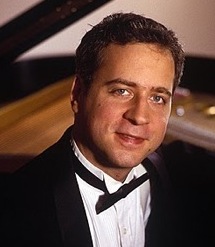The long-running Ojai Music Festival has partnered with Cal Performances for the last four years to reprise the highlights from their week of concerts in Southern California. On Thursday, June 19 they kicked off Ojai North! at UC Berkeley’s Hertz Hall.
What distinguishes this festival from most others is that they change artistic directors every year, an ingenious way to infuse it with fresh vision and energy. Last year dance choreographer Mark Morris directed, showing off his new adaptation of Acis and Galatea. This year the baton was passed to Jeremy Denk, a renowned pianist and the recent recipient of a MacArthur “genius” grant for his writings on music.
 Denk’s vision was to complement great and re-imagined works of the musical canon with a comic opera that pokes fun at that same canon. “This is music of reverence and music of irreverence… Nobody’s ever written an opera about music theory,” he said, and went on to create a response to Charles Rosen’s seminal work of musicology, The Classical Style. Denk authored the libretto for his The Classical Style: An Opera (of Sorts) and Steven Stucky composed the score. Stucky, a prominent American composer known to Berkeley audiences for last year’s partnership with the Berkeley Symphony, created music that was a seamless pastiche of his own airy textures and passages from Mozart.
Denk’s vision was to complement great and re-imagined works of the musical canon with a comic opera that pokes fun at that same canon. “This is music of reverence and music of irreverence… Nobody’s ever written an opera about music theory,” he said, and went on to create a response to Charles Rosen’s seminal work of musicology, The Classical Style. Denk authored the libretto for his The Classical Style: An Opera (of Sorts) and Steven Stucky composed the score. Stucky, a prominent American composer known to Berkeley audiences for last year’s partnership with the Berkeley Symphony, created music that was a seamless pastiche of his own airy textures and passages from Mozart.
The four-day festival opened with a supple reading of Haydn’s “Rider” String Quartet performed by the quartet, Brooklyn Rider. An equable foursome, Brooklyn Rider gave a reading that thankfully emphasized the second violin part as much as the first, recreating Haydn’s ideal of four equally-weighted voices in a gentle and comradely discourse. With Haydn’s language in our ears, we were ready for the send up and analysis.
The opera opened with starry triangle and descending flute arpeggios, intimating that wide and strangely close moment when day turns to dark. Then Stucky settled into the grand and mysterious overture to Don Giovanni. Mozart’s minor blasts were crafted by The Knights, a perfect-sized opera orchestra of 38, as the backdrop for the entrance of three bored (and dead) composers – Haydn, Mozart and Beethoven. As the scene opened, they were playing scrabble in Heaven and moaning about the loss of their relevance and of the decline of classical audiences in general.
“What’s classical music?” asks a student.
“It’s music so beautiful that it has to be explained,” answers a mythologized Charles Rosen.
And that seems to sum up the opera, which is hilarious and contradictory, full of low humor, such as Haydn hitting Beethoven with a music theory book, and lots of scenes in a bar. In between, we understand the relationship between Tonic, Dominant and Subdominant, played by three singers in a bizarre love triangle. Subdominant had a luscious mezzo voice, performed by Peabody Southwell, and Tonic’s self-absorbed “me, me, me…” aria was personified by winning baritone Aubrey Allicock.
Among the clever though abstruse elements, when the Tristan chord staggers into the bar in a search for closure (and a welcome drink), it brought down the house. Of course, it must be said that this was an uncommonly knowledgeable audience, which stirred at the first strains of Tristan und Iseult. That chord, based on the seventh note of a scale, yearns to climb one more step to finish the scale, but only finds itself in new uncertainties, wandering through keys into final resolution only at the end of that long Wagnerian opera, the well-known Prelude and Liebestod.
In between sight gags, abstruse humor and dollops of music theory, we were exposed to some gorgeous trios, perhaps inspired by Mozart’s divine ensemble writing.
There is much that is timeless about classical music, and it was a little abrupt that, rather than finishing his opera with a love poem to classical mastery, Denk sends off his ghosts rather peremptorily, burying them under a shovelful of Romanticism.
The rest of the weekend promised more “reverence and irreverence,” with a re-imagining of Mahler by the Uri Caine Ensemble, Kurt Weill’s Seven Deadly Sins starring chanteuse Storm Large, and a contradictory program of Ives, Mozart and Feldman. Then Denk polishes off the festival with the difficult beauty of Ligeti’s Piano Etudes. I heard Denk perform those two years ago in this hall, and it was glorious.
—Adam Broner
Picture, top, of Jeremy Denk, courtesy of Classical Artists
